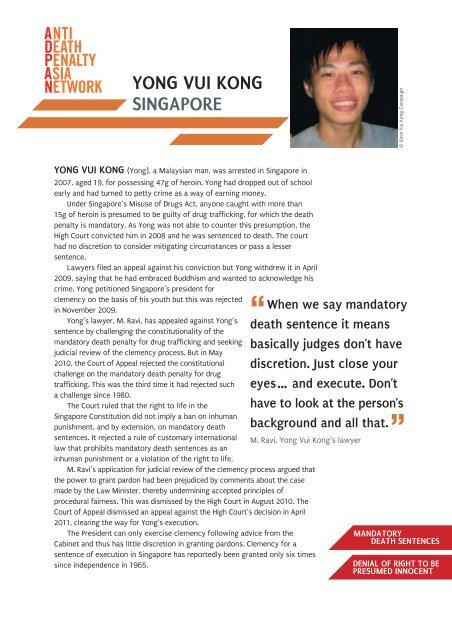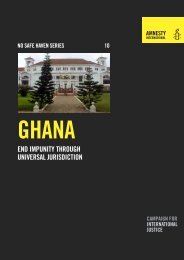Injustice - Amnesty International Schweiz
Injustice - Amnesty International Schweiz
Injustice - Amnesty International Schweiz
You also want an ePaper? Increase the reach of your titles
YUMPU automatically turns print PDFs into web optimized ePapers that Google loves.
YONG VUI KONG<br />
SINGAPORE<br />
© Save Vui Kong Campaign<br />
YONG VUI KONG (Yong), a Malaysian man, was arrested in Singapore in<br />
2007, aged 19, for possessing 47g of heroin. Yong had dropped out of school<br />
early and had turned to petty crime as a way of earning money.<br />
Under Singapore’s Misuse of Drugs Act, anyone caught with more than<br />
15g of heroin is presumed to be guilty of drug trafficking, for which the death<br />
penalty is mandatory. As Yong was not able to counter this presumption, the<br />
High Court convicted him in 2008 and he was sentenced to death. The court<br />
had no discretion to consider mitigating circumstances or pass a lesser<br />
sentence.<br />
Lawyers filed an appeal against his conviction but Yong withdrew it in April<br />
2009, saying that he had embraced Buddhism and wanted to acknowledge his<br />
crime. Yong petitioned Singapore’s president for<br />
clemency on the basis of his youth but this was rejected<br />
in November 2009.<br />
Yong’s lawyer, M. Ravi, has appealed against Yong’s<br />
sentence by challenging the constitutionality of the<br />
mandatory death penalty for drug trafficking and seeking<br />
judicial review of the clemency process. But in May<br />
2010, the Court of Appeal rejected the constitutional<br />
challenge on the mandatory death penalty for drug<br />
trafficking. This was the third time it had rejected such<br />
a challenge since 1980.<br />
The Court ruled that the right to life in the<br />
Singapore Constitution did not imply a ban on inhuman<br />
punishment, and by extension, on mandatory death<br />
sentences. It rejected a rule of customary international<br />
law that prohibits mandatory death sentences as an<br />
inhuman punishment or a violation of the right to life.<br />
M. Ravi’s application for judicial review of the clemency process argued that<br />
the power to grant pardon had been prejudiced by comments about the case<br />
made by the Law Minister, thereby undermining accepted principles of<br />
procedural fairness. This was dismissed by the High Court in August 2010. The<br />
Court of Appeal dismissed an appeal against the High Court’s decision in April<br />
2011, clearing the way for Yong’s execution.<br />
The President can only exercise clemency following advice from the<br />
Cabinet and thus has little discretion in granting pardons. Clemency for a<br />
sentence of execution in Singapore has reportedly been granted only six times<br />
since independence in 1965.<br />
“<br />
When we say mandatory<br />
death sentence it means<br />
basically judges don’t have<br />
discretion. Just close your<br />
eyes… and execute. Don’t<br />
have to look at the person’s<br />
background and all that. ”<br />
M. Ravi, Yong Vui Kong’s lawyer<br />
MANDATORY<br />
DEATH SENTENCES<br />
DENIAL OF RIGHT TO BE<br />
PRESUMED INNOCENT
















